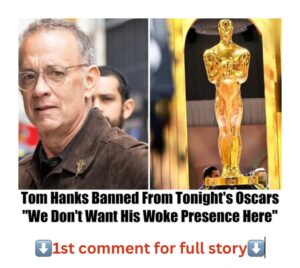
In a surprising turn of events that has sent shockwaves through the entertainment realm, Tom Hanks, a luminary synonymous with cinematic excellence, finds himself conspicuously absent from the prestigious Oscars ceremony tonight. The official statement released by the Academy has cited a desire to maintain an atmosphere devoid of what they termed as “overly politicized presence,” a phrase that has set ablaze a maelstrom of controversy, sparking heated debates and profound reflections on the intricate dynamics within Hollywood and its evolving relationship with societal and political activism.
Tom Hanks, hailed for his illustrious career spanning over four decades and encompassing a plethora of iconic roles in American cinema, transcends the mere label of an actor; he embodies a cultural icon, emblematic of values such as integrity, decency, and humanity. His notable exclusion from the Oscars, an event he has graced numerous times as both nominee and winner, signifies a pivotal moment in the industry, hinting at a potential paradigm shift in the landscape of Hollywood and its engagement with broader societal issues.
“We seek to maintain an atmosphere free from overly politicized presence,” read the terse statement from the Academy, a statement laden with implications that resonate far beyond its brevity. At first glance, it appears to be a direct critique of Hanks’s recent forays into social advocacy off-screen, which have increasingly veered into the realm of political and social activism. However, the ramifications of this decision extend far deeper, touching upon the intricate interplay between entertainment, politics, and public perception.
In recent years, the term “overly politicized presence” has metamorphosed into a nebulous catch-all phrase, praised by some as a commendable display of awareness and activism surrounding social issues, while criticized by others as emblematic of what they perceive as an excessive preoccupation with political correctness or virtue signaling. Hanks, akin to many of his peers, has unflinchingly utilized his platform to address issues close to his heart, ranging from advocating for historical education to championing social justice initiatives. The Academy’s deployment of this term in its statement thus raises pertinent questions about the extent to which such activism is tolerated within the industry’s most esteemed circles.
The response to Hanks’s conspicuous absence from the Oscars has been nothing short of polarizing, with proponents of the decision arguing vehemently for the preservation of the ceremony as a celebration of cinematic achievement, divorced from the influence of personal politics and social agendas. They contend that the evening should remain a sanctum dedicated solely to the recognition of artistic prowess, craftsmanship, and storytelling, untainted by the political or ideological inclinations of its participants.
Conversely, detractors of the decision perceive it as a perilous precedent, a stifling of dissent and a repudiation of the historical role artists have played in societal discourse. They argue fervently that the arts, particularly cinema, have always served as conduits through which challenging questions are posed and explored, and that the voices of creators should never be muzzled, especially within forums designed to celebrate their contributions.
This incident serves as a catalyst for a broader reflection on Hollywood’s intricate relationship with politics and activism. The film industry boasts a storied history of grappling with political and social issues, from the dark era of blacklisting suspected Communists during McCarthyism to the more recent #MeToo movement. The exclusion of Tom Hanks from the Oscars can thus be interpreted as another chapter in the ongoing dialogue surrounding the place of personal conviction within public celebration.
Moreover, this decision beckons a thorough reevaluation of the fundamental essence of the Oscars, and indeed, all award shows. Is the primary objective solely to acknowledge technical and artistic merit, or is there ample space to recognize the broader impact of the industry’s leading figures, encompassing their off-screen endeavors and advocacy? And critically, who retains the authority to make such determinations?
The banishment of Tom Hanks from tonight’s Oscars ceremony transcends mere controversy; it serves as a reflective mirror, offering poignant insights into the current state of an industry at a crossroads and a society grappling with the intricacies of expression, activism, and art. As the red carpet is unfurled and accolades are bestowed, the palpable absence of one of Hollywood’s most enduring luminaries stands as a silent testament to the underlying tensions simmering beneath the surface of glamour and glitz.
The long-term repercussions of this decision remain shrouded in uncertainty. Will it engender a retreat into political neutrality, or will it galvanize industry insiders to more ardently embrace their platforms for advocacy? And how will audiences respond to this seismic shift? The answers to these pressing questions will inexorably shape the future trajectory of Hollywood, exerting a profound influence not only on who is welcomed into its grandest celebration but also on the values and voices championed in the narratives it elects to propagate.
Tonight, as the Oscars unfold sans the presence of Tom Hanks among its illustrious attendees, the industry finds itself standing at a critical juncture, confronted with pivotal decisions concerning its identity, values, and societal role. The reverberations of these decisions are poised to extend far beyond the confines of a single awards ceremony, heralding a moment of introspection and, potentially, redirection for Hollywood and all those who find solace, inspiration, and provocation within the enchanting realm of cinema.